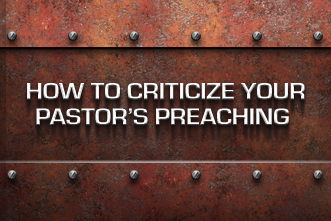You’ll build a great church, pastor, if you ever learn how to communicate.
Listening to that sermon was like drinking from a fire hydrant.
I’m so disappointed! I wanted you to give God all the glory. And you missed it!
Your preaching is too intellectual.
Your preaching is too practical.
You don’t talk enough about social justice.
You talk about social justice too much.
Your preaching is over people’s heads.
Your preaching isn’t deep enough.
Give us meat, not milk.
I have heard all these statements, or at least these sentiments, about my preaching.
Some have fallen asleep during my preaching.
One woman shook her head in disagreement as I taught on election, while others have argued with me while I was still in the pulpit.
I’ve had folks corner me after church to debate theology. Secondhand reports have informed me of church members who weren’t getting anything from my preaching. One guy said he felt like he was sitting in class (too many points, I suppose). Others have graciously and gently met with me face-to-face to confess they were not being fed.
Some of these criticisms surprised me.
Some felt unfair.
Don’t Miss
A few hurt.
Some were well-deserved (especially the “fire hydrant” comment).
Occasionally they roll off, but the fact I remember so many of them proves they stick. Every experienced preacher could add to the list. Personal criticism is one of the job hazards of Christian ministry.
It’s also one of the great benefits.
Preachers need and value feedback. And we need more than just the compliments (though we appreciate those, too).
There are no perfect preachers. We all need iron-sharpening dialogue with hearers about both our content and delivery.
So don’t read this article as a whining complaint from a beleaguered pastor who can’t take it anymore. I don’t want people in my congregation to stop giving critical feedback for fear of bruising my ego.
But both preachers and hearers, those who are critiqued and those who offer critique, can make the dialogue more effective.
So here are some suggestions for each.












